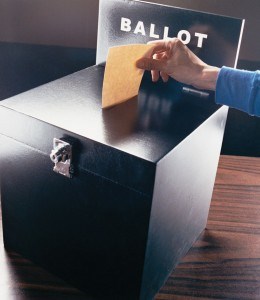 About 20 per cent of Jasper’s population is ineligible to vote in the upcoming municipal election.
About 20 per cent of Jasper’s population is ineligible to vote in the upcoming municipal election.
Those 1,000 to 1,500 people are either under the age of 18, haven’t lived in Alberta for six consecutive months before the election or don’t have Canadian citizenship.
“Say there’s 1,000 that can’t vote,” said Beryl Cahill, Jasper’s returning officer, “of that, probably, 500 are temporary workers, people who were just here for a short space of time or they’re not Canadian citizens.”
Joerg Michel, a German citizen who’s lived in Canada for five years and Jasper for one, is one of those people. As a permanent resident, he has many of the same rights as a citizen, but not the right to vote.
“The Charter applies to us and all the laws apply to us, like everybody else in Canada, however we can’t vote.
“That’s a pity,” he said, “because obviously, since this is the place where we live, we would love to have the opportunity to have a say in where the community goes.”
Of course, Michel could become a Canadian citizen and in turn gain the right to vote, but because of German law, that would likely mean giving up citizenship in his home country.
“It’s up to the individual to decide whether he or she wants to pay the price [to become a citizen]. For me, right now, the price is just too high and that is not the fault of Canada, that is the fault of my home country, who makes it incredibly difficult to have dual citizenship.”
To vote in a municipal election, you have to be 18 years or older, a Canadian citizen, a resident of the municipality and you have to have lived in the province for six consecutive months before the election.
And, for the first time, this year you also have to have valid photo ID with your name and address on it.
What’s interesting to contemplate, said Michel, is what election issues would be addressed if permanent residents and foreign workers were allowed to vote.
“Because newcomers to Canada might have different priorities,” he said. “Obviously I don’t know whether it would change the outcome of the election, but certainly what could happen if there was a right to vote for non-citizens, then all the candidates would have to take the issues that are of concern to that group seriously.
“I’m not saying they’re not doing it now, but maybe they would need to shift their focus a little bit.”
To bring those issues to the forefront, although non-citizens can’t vote, they can still engage in the election process, said Jerry Ward, public affairs officer for Alberta Municipal Affairs.
“There are no exceptions/special rules for temporary foreign workers that permit them to vote,” he wrote in an email. “That being said there are no restrictions under the [Local Authorities Election Act] if they want to become involved in the campaigning process for candidates they support (like door knocking, phoning for support, volunteering at campaigning activities, etc.),” he wrote in an email.
“I guess the key is, hurry up and get your Canadian citizenship and then you can vote,” said Cahill, who became a citizen many years ago after immigrating to Canada from England.
ĚýNicole Veerman
[email protected]
